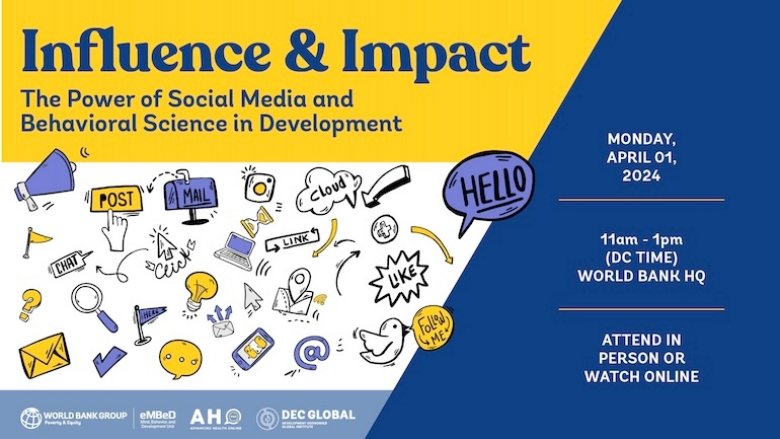Harnessing the Power of Behavioral Science and Digital Social Tools for Development
By Zeina Afif, Rhys Lim, Renos Vakis
Over 60% of people around the world are active on social media, reshaping how we connect with each other, revolutionizing development, and improving lives. Globally, the #MeToo movement showcased how social media can spark global conversations on critical issues like gender equality and justice. In Kenya, mobile banking initiatives have empowered millions by simplifying financial transactions, while Estonia's pioneering e-governance platforms have set an international standard for digital public services.
Moreover, the integration of behavioral science into public policy is creating more aligned and effective strategies to better meet human needs. Subtle changes in how choices are presented can significantly enhance decision-making in critical areas such as health, education, and finance.
To explore these intersections, more than 500 participants ¨C including experts from government, academia, the technology industry, and international organizations ¨C joined the World Bank on April 1 to discuss the influence and impact of social media and behavioral science in development. Here are some key takeaways.
Successful and Promising Examples
While research and experiments on social media is not new, it became a critical tool during the COVID-19 pandemic and other recent crises. Fadia Saadeh, the World BankˇŻs regional director for human development in the Middle East and North Africa, shared how social media supported timely, low-cost, and effective data collection and research during times of crisis. This included the aftermath of the and during the COVID-19 pandemic, when online surveys and experiments informed government strategies, including messages that helped increase average vaccination intention by up to 25%.
KX Jin, advisor for the Advancing Health Online Initiative, shared insightful examples from his past tenure as head of health at Meta, such as , a mobile health care platform that provides critical information and vital services for pregnant women and new mothers in South Africa via WhatsApp. Mothers using this platform were 10 times more likely to submit questions compared to other channels; on average, 1.8 million WhatsApp messages were exchanged monthly through this service.
Dr. Ghaith Owies, director of the Health Communication and Awareness Directorate at the Ministry of Health in Jordan, recounted how the country successfully integrated behavioral science and digital technologies into public health campaigns. This included social media research to encourage more people to get vaccinated and WhatsApp chatbots to combat health misinformation.
Speakers presented other notable examples, including a chatbot in Madagascar to tackle elite capture, educational entertainment programs in India to reshape gender norms, and a Twitter initiative in Nigeria to curb hate content. Ĺ·ĂŔČŐb´óƬ has also developed a new skill assessment tool, , which helps measure cognitive and socioemotional skills to promote learning and personal development, as well educational games via a WhatsApp chatbot that teaches common misinformation tactics, helping boost misinformation discernment by 32% among users.
Addressing Challenges
The digital era is not without its challenges, however. The digital divide, if left unchecked, threatens to exacerbate poverty by leaving segments of the population disconnected. Fadia underscored the critical role governments play in bridging this gap by expanding digital access, enhancing digital literacy, and fostering a digital economy ¨C empowering people to fully utilize social media and other digital platforms.
Jay van Bavel, professor of Psychology at New York University, discussed the less favorable aspects of digital life, including its influence on human interactions, the risk of addiction, the spread of misinformation, and societal polarization. He explained, ˇ°5 billion people are using social media every day. Social media is [part of] their information diet. Just like we care about what people eat and strive for a healthy diet, we should aim for a healthy information diet as well.ˇ±
The event also delved into the issue of content moderation, questioning the roles and accountability of those who oversee digital content and underscoring the need for transparent and accountable moderation practices. As Arianna Legovini, director of the Development Impact Evaluation group at the World Bank, asked, "Who are the censors, and who will be checking the checkers?"
Beyond infrastructure and affordability, the digital divide encompasses usability and accessibility. Behavioral science can play a key role in encouraging the adoption of new technologies, making them more accessible and optimizing their use for greater impact.
Looking Forward
By harnessing these opportunities and addressing the potential challenges head-on, countries can forge a path toward a more inclusive, informed, and healthy digital future. Arturo Herrera Gutierrez, the global director for governance at the World Bank, called for better understanding and use of digital social tools for development.
The landscape is ripe with potential, as evidenced by Jordan's forward-thinking approach to digital health and how they used social media to tackle health priorities beyond the pandemic. The anticipated impact of artificial intelligence and machine learning on policy-making presents further opportunities for digital platforms. Fadia's reminder resonates deeply: the aim is to wield technology wisely, ensuring it serves us rather than overwhelms us.
As we navigate these transformations, it is important to understand, engage with, and ultimately scale digital solutions that address global challenges. This approach is not just about adapting to change but about leading it, ensuring that digital advancements foster inclusivity, sustainability, and equity worldwide.
-------------------------------------------
Watch the event recordings and learn more about how the World Bank uses behavioral science and digital social tools to address global challenges and eliminate poverty on a livable planet.
